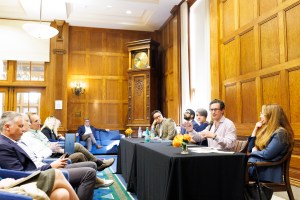Collaboration yields first citywide network of wireless sensors
Harvard University, BBN Technologies, and the city of Cambridge have begun a four-year project to install 100 wireless sensors atop streetlights in Cambridge, Mass., creating the world’s first citywide network of wireless sensors.
Sponsored by the National Science Foundation, the project is open-source, meaning it could eventually be accessible to researchers worldwide for everything from gathering meteorological data to monitoring traffic conditions and noise pollution.
Called CitySense, the wireless sensor network developed by computer scientists at Harvard and BBN Technologies, a technology solutions firm in Cambridge, will focus initially on monitoring air pollution and weather conditions, collecting data on a scale never before attempted.
“Wireless sensor networks have the potential to revolutionize the real-time monitoring of the environment, civil structures, roadways, and animal habitats,” says Matt Welsh, assistant professor of computer science in Harvard’s School of Engineering and Applied Sciences. “This will be one of the largest projects of its kind, and the entire 100-sensor infrastructure will eventually be open to anyone with a computer and an Internet connection. That could mean an atmospheric science researcher in Tulsa or a 10th-grade high school teacher in San Francisco would only have to design an experiment and sign up for a time slot to run it on CitySense.”
Welsh and his team are in the prototyping stage, but they hope to place up to 20 sensors in two years, 50 by their third year, and all 100 sensors within four years. The sensors, to be installed on and powered by public streetlights, will measure temperature, wind speed, rainfall, barometric pressure, and air quality, but the possibilities are endless. The ease with which additional sensors can be plugged in locally or tested remotely has led to long-term proposals for CitySense sensors including biosensors for airborne contaminants and microphones to study noise pollution.
“The sensors could become a springboard to providing citywide wireless Internet access, as well as for collecting data from mobile sensors mounted in buses and automobiles,” says Welsh, who has previously outfitted his building on the Harvard campus with some 190 of the units, as well as deployed wireless sensors on active volcanoes in Ecuador. His use of the sensors in an outdoor setting should help researchers learn whether sensor network experiments performed in laboratory simulations — as in most research to date — are representative of those performed in an uncontrolled outdoor environment.
Josh Bers, Welsh’s collaborator at BBN Technologies, is designing the wireless sensor nodes. By using multihop wireless networking software that links each node with its neighbors to form a mesh, Bers can ensure that CitySense remains available to researchers despite the harsh weather atop city streetlights.
The city of Cambridge is playing an important role in this project, supporting the sensor installation on light poles throughout the city.
CitySense’s first task will be to monitor air pollution transport in a dense urban environment for Majid Ezzati, associate professor of international health in the Harvard School of Public Health. Ezzati hopes to gain valuable data on airborne pollutants’ public health impact. Because data will be collected from multiple sources across the city, the sensors will provide a more complete picture of environmental data than current data collected locally from one center.
“This is really just a first step to make sure this interactive, visual, real-time sensor network is operational,” Welsh says. “We think this can be more than a sensor network test bed for scientists across the country who want to design their own citywide experiments. We also believe the network as a whole could provide the groundwork for cities looking to install universal wireless Internet.”
Welsh and Bers are working with Tufts University’s Center for Engineering Educational Outreach to create a K-12 curriculum to accompany CitySense and make complex engineering concepts more easily understandable.





